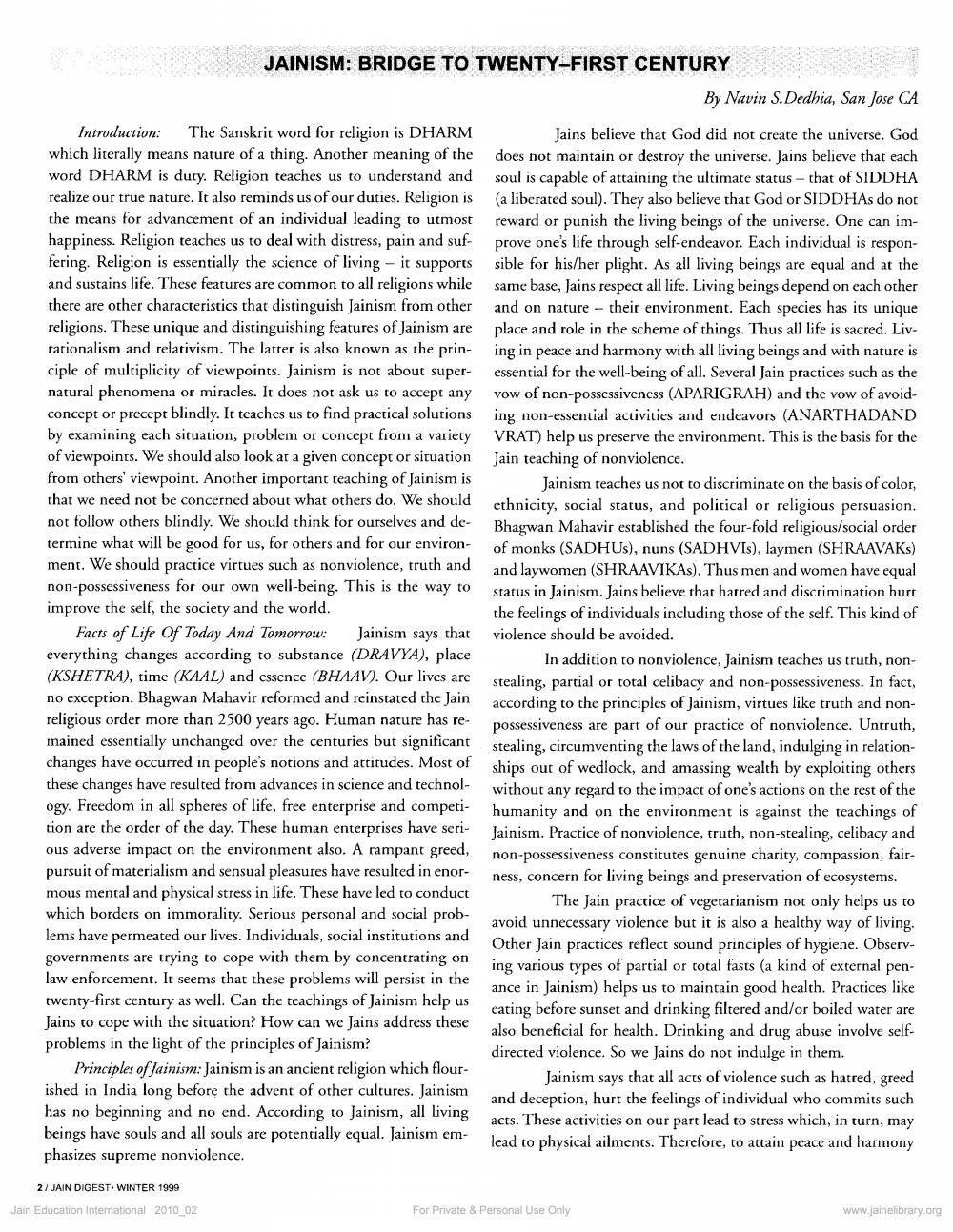________________
JAINISM: BRIDGE TO TWENTY-FIRST CENTURY
By Navin S.Dedhia, San Jose CA
violence.
Introduction: The Sanskrit word for religion is DHARM which literally means nature of a thing. Another meaning of the word DHARM is duty. Religion teaches us to understand and realize our true nature. It also reminds us of our duties. Religion is the means for advancement of an individual leading to utmost happiness. Religion teaches us to deal with distress, pain and suf- fering. Religion is essentially the science of living - it supports and sustains life. These features are common to all religions while there are other characteristics that distinguish Jainism from other religions. These unique and distinguishing features of Jainism are rationalism and relativism. The latter is also known as the prin- ciple of multiplicity of viewpoints. Jainism is not about super- natural phenomena or miracles. It does not ask us to accept any concept or precept blindly. It teaches us to find practical solutions by examining each situation, problem or concept from a variety of viewpoints. We should also look at a given concept or situation from others' viewpoint. Another important teaching of Jainism is that we need not be concerned about what others do. We should not follow others blindly. We should think for ourselves and de- termine what will be good for us, for others and for our environ- ment. We should practice virtues such as nonviolence, truth and non-possessiveness for our own well-being. This is the way to improve the self, the society and the world.
Facts of Life Of Today And Tomorrow: Jainism says that everything changes according to substance (DRAVYA), place (KSHETRA), time (KAAL) and essence (BHAAV). Our lives are no exception. Bhagwan Mahavir reformed and reinstated the Jain religious order more than 2500 years ago. Human nature has re- mained essentially unchanged over the centuries but significant changes have occurred in people's notions and attitudes. Most of these changes have resulted from advances in science and technol- ogy. Freedom in all spheres of life, free enterprise and competition are the order of the day. These human enterprises have serious adverse impact on the environment also. A rampant greed, pursuit of materialism and sensual pleasures have resulted in enormous mental and physical stress in life. These have led to conduct which borders on immorality. Serious personal and social problems have permeated our lives. Individuals, social institutions and governments are trying to cope with them by concentrating on law enforcement. It seems that these problems will persist in the twenty-first century as well. Can the teachings of Jainism help us Jains to cope with the situation? How can we Jains address these problems in the light of the principles of Jainism?
Principles of Jainism: Jainism is an ancient religion which flourished in India long before the advent of other cultures. Jainism
ism has no beginning and no end. According to Jainism, all living beings have souls and all souls are potentially equal. Jainism emphasizes supreme nonviolence
Jains believe that God did not create the universe. God does not maintain or destroy the universe. Jains believe that each soul is capable of attaining the ultimate status - that of SIDDHA (a liberated soul). They also believe that God or SIDDHAs do not reward or punish the living beings of the universe. One can improve one's life through self-endeavor. Each individual is responsible for his/her plight. As all living beings are equal and at the same base, Jains respect all life. Living beings depend on each other and on nature - their environment. Each species has its unique place and role in the scheme of things. Thus all life is sacred. Living in peace and harmony with all living beings and with nature is essential for the well-being of all. Several Jain practices such as the vow of non-possessiveness (APARIGRAH) and the vow of avoiding non-essential activities and endeavors (ANARTHADAND VRAT) help us preserve the environment. This is the basis for the Jain teaching of nonviolence.
Jainism teaches us not to discriminate on the basis of color, ethnicity, social status, and political or religious persuasion. Bhagwan Mahavir established the four-fold religious/social order of monks (SADHUS), nuns (SADHVIS), laymen (SHRAAVAK) and laywomen (SHRAAVIKAs). Thus men and women have equal status in Jainism. Jains believe that hatred and discrimination hurt the feelings of individuals including those of the self. This kind of violence should be avoided.
In addition to nonviolence, Jainism teaches us truth, nonstealing, partial or total celibacy and non-possessiveness. In fact, according to the principles of Jainism, virtues like truth and nonpossessiveness are part of our practice of nonviolence. Untruth, stealing, circumventing the laws of the land, indulging in relationships out of wedlock, and amassing wealth by exploiting others without any regard to the impact of one's actions on the rest of the humanity and on the environment is against the teachings of Jainism. Practice of nonviolence, truth, non-stealing, celibacy and non-possessiveness constitutes genuine charity, compassion, fairness, concern for living beings and preservation of ecosystems.
The Jain practice of vegetarianism not only helps us to avoid unnecessary violence but it is also a healthy way of living. Other Jain practices reflect sound principles of hygiene. Observing various types of partial or total fasts (a kind of external penance in Jainism) helps us to maintain good health. Practices like eating before sunset and drinking filtered and/or boiled water are also beneficial for health. Drinking and drug abuse involve selfdirected violence. So we Jains do not indulge in them.
Jainism says that all acts of violence such as hatred, greed and deception, hurt the feelings of individual who commits such acts. These activities on our part lead to stress which, in turn, may lead to physical ailments. Therefore, to attain peace and harmony
27 JAIN DIGEST- WINTER 1999 Jain Education Interational 2010_02
For Private & Personal Use Only
www.jainelibrary.org




